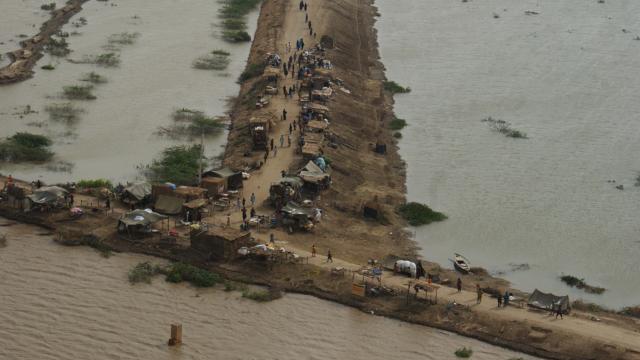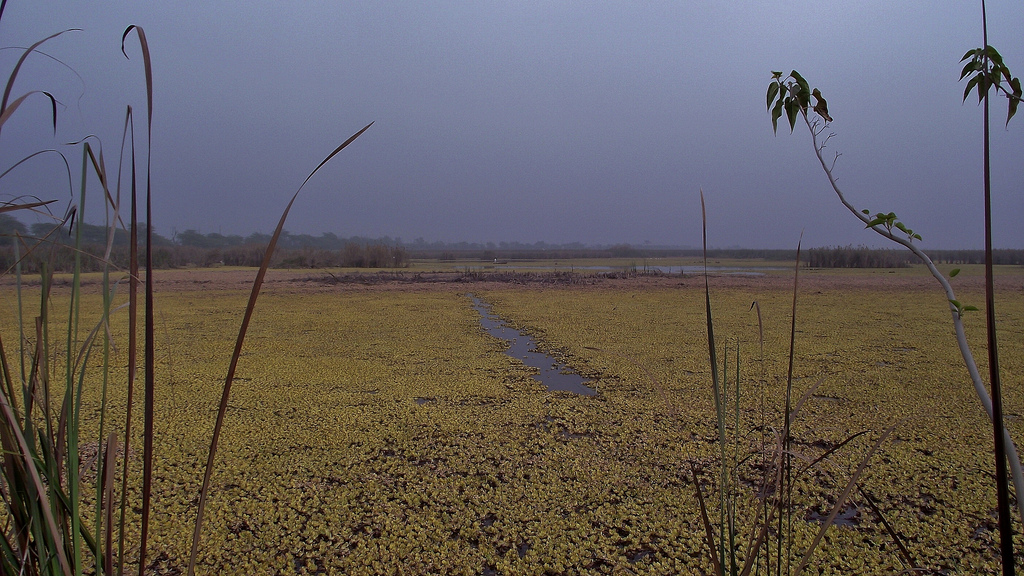
PESHAWAR, Pakistan – “They are never coming this side,” said Gulab Khan when asked about the birds that formerly visited his field in the far flung village of Charsadda. After weeks of exhaustive effort during the wheat harvesting season here, Khan finally managed to hunt some of the birds. But it wasn't like anything he had experienced previously.
Khan is a farmer whose family has been working in agriculture for generations. Now, he said, his family is worried as the environmental and climate conditions around them are changing. Temperature has increased. Rains are more severe, untimely and unexpected. And perhaps most worrisome of all, wetlands that used to be available to wildlife next to Khan's field have vanished, either covered by houses or converted into further agriculture.
"Our farmers regard wetlands as 'wasted lands' and even sources of disease," said Khan, despite the fact that those same wetlands have maintained the underground water table and supported a healthy ecosystem. Birds are now changing their direction and flight patterns due to degradation of those wetlands, which have steadily deteriorated as Pakistan's human population has increased. It is just one of the ways that climate change is already having a marked impact on the country.
Attempts to Solve the Crisis
The Pakistan Wetland Program, launched by the government with the support of several international agencies and non-profits, works to preserve the country's 225 manmade and natural wetlands. All told, wetlands in Pakistan cover an estimated 780,000 hectares – the equivalent of close to 10 percent of the total surface area of the country. Nineteen of Pakistan's wetland sites have been recognized internationally under the Ramsar Convention on Wetlands, which entered into force in 1978.
The degradation of Pakistan's wetlands started as early as 1967, according to an investigation led by the World Wildlife Fund. The organization's research revealed that wildlife and wetlands resources in the country have since become severely threatened and, in most areas, declined in condition. The expedition recommended that a range of wetland sites be declared protected areas.
The same is true for the agricultural lands that closely depend on the wetlands. According to officials, cultivatable land has shrunk since 1985 – at a decline of around 11.6 square kilometers annually – as the housing sector has required ever more growth. The wetlands around those agriculture lands have likewise suffered.
According to the Pakistan Wetland Program, wetlands sustain an estimated 144 million residents in addition to 3 to 4 million displaced persons from neighboring countries. In all, 18 threatened species of wetlands-dependent mammals are found in the country, including the endemic Punjab Urial and Indus River Dolphin. A total of 23 threatened birds species are supported by Pakistan's wetlands, as well as 12 species of reptiles and two endemic species of amphibians. The country's wetlands support close to 200 indigenous freshwater fish species, including 15 endemic to Pakistan, and nearly 800 marine and estuarine fish species.
Recently, more and more fish in the rivers here have succumbed to strange diseases and died. Pakistan's rivers are highly polluted due to the unregulated flow of sewage and industrial effluents. Aquatic weed infestations have additionally affected a sprawling 182,000 hectares, adversely affecting fish production. “Straightening and channelization of riverbeds with dikes as a flood protection also affected [their decline],” said Dr. Inayat Ali Shahjehan, head of the zoology department at the University of Peshawar.
Adjusting to the increasing climatic changes, the country has put in place more flood protections to handle the heavy rains that have damaged the nation's wetlands. Pakistan has also heavily regulated its rivers through construction of dams which, at the same time, fulfill a rising demand for irrigation and hydroelectric power. Currently, in Khyber Pakhtunkhwa, work on more than 300 small dams is in progress; the government has meanwhile invited foreign investors to grow the sector. Already, the impacts of this development on Pakistan's rivers and other natural bodies of water, including swamps and marshes, include increased salinization, lower underground water reserves, less biodiversity and impoverishment of fish stocks.
“Population pressures and increased economic developments are the driving factor for the degradation of these wetlands, making a mockery of the eminent value of wetlands, especially the ecological ones,” said Dr. Shahjehan. He added that a broad spectrum of human-made threats – rooted in widespread poverty, lack of knowledge and mismanagement – are threatening ecosystems and many bird and mammal species dependent on the wetlands.
“Poor natural resource management, coupled with poorly planned or executed development activities, are continuing to deplete the limited renewable natural resource base of the country,” added Shahjehan.
Attacked From All Sides
Along with population growth and the overuse or destruction of the wetlands it has brought, the release of chemicals and toxic waste from pharmaceuticals, marble, leather and other industries – which are often discharged directly into tributaries that flow into the wetlands – has done immeasurable harm. In Khyber-Pakhtunkhwa, for example, not a single industrial unit has a wastewater treatment system. Under a new industrialization policy, Pakistan is trying to make wastewater treatment a binding requirement on every industrial unit.
“Measures should be taken to check on the inadequate funding, political interference and limited awareness by the population of the existing wetland legislation,” Shahjehan said. “This should further be backed by the adoption of new and innovative approaches that effectively integrate various aspects of wetland management to curtail the current degradation of catchment areas and ecologically fragile areas.”
3 WAYS TO SHOW YOUR SUPPORT
- Log in to post comments












